Do you aspire to fluently speak Japanese? Mastering Japanese has become a cherished ambition among numerous non-native speakers. Despite its reputation of being a challenging foreign language to acquire, there are countless enthusiasts of Japanese worldwide. In July 2023, over 698,062 individuals in Japan and abroad sat for the Japanese language exam.[1]
Not only does this number exclude those learning Japanese for personal reasons without seeking a JLPT certification, but also the advantages of fluently speaking the language are a major draw. In 2021, the Japan Foundation compiled data revealing the enrollment of over 2 million students studying Japanese in China, Indonesia, and South Korea.[2] Mastering Japanese can lead to numerous benefits, including unforeseen career opportunities, making it a goal for many.
However, due to the unique characteristics of the Japanese language itself, mastering it is no easy feat. Rumors among Japanese language students suggest that at least 2,000 hours of practice are needed to achieve fluency. Consequently, several nations have implemented regulations for Japanese language learning curricula for students from an early age, along with English.
Especially in Japanese pronunciation, mastering good Japanese pronunciation can take a long time for many Japanese language students. To effectively communicate in Japanese, what can you do to improve your Japanese proficiency? Please read our comprehensive description of the 10 Best Ways to Speak Japanese Fluently below!
Read also:
10 Great Tips for Learning Japanese Fast
How to Learn Japanese for Beginners: 10 Steps
How Long Does It Take to Be Fluent in Japanese?
10 Best Ways on How to Speak Japanese Fluently
1. Learn how to pronounce hiragana, katakana and kanji at first
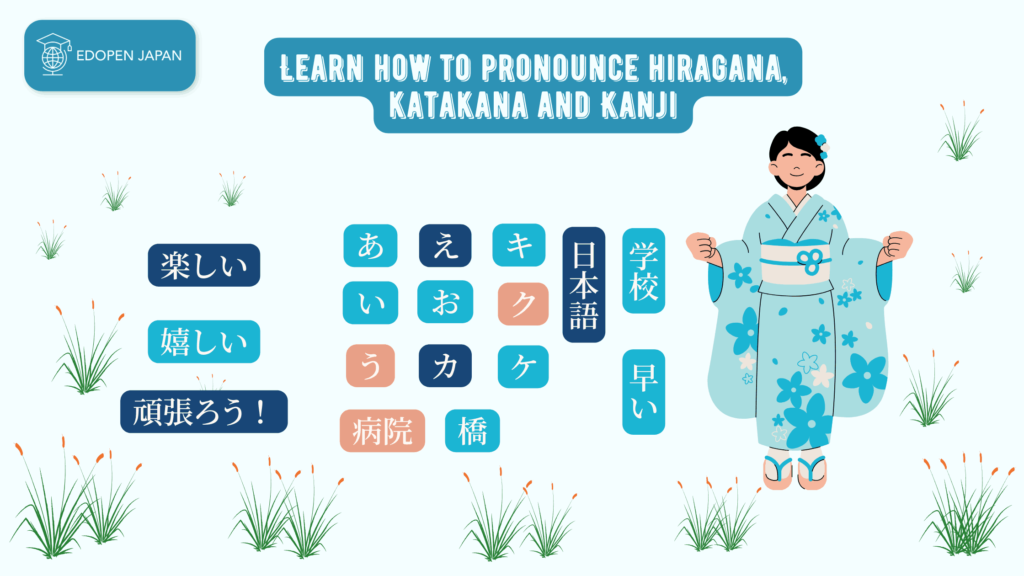
The 3 essential systems that every Japanese learner must know are hiragana (平仮名/ひらがな), katakana (片仮名/カタカナ) and kanji (漢字/かんじ) as well.
To begin, learn hiragana to kick start your Japanese learning journey. Master pronouncing each hiragana character to build your foundation. Hiragana will aid you in reading the Kanji. Japanese sentences typically consist of hiragana, kanji, and katakana.
Please click the links below to learn more about the three crucial characters and romaji, which is also widely used in colloquial Japanese. With consistent repetition, you will master it soon.
2. Learn simple Japanese conversations consistently
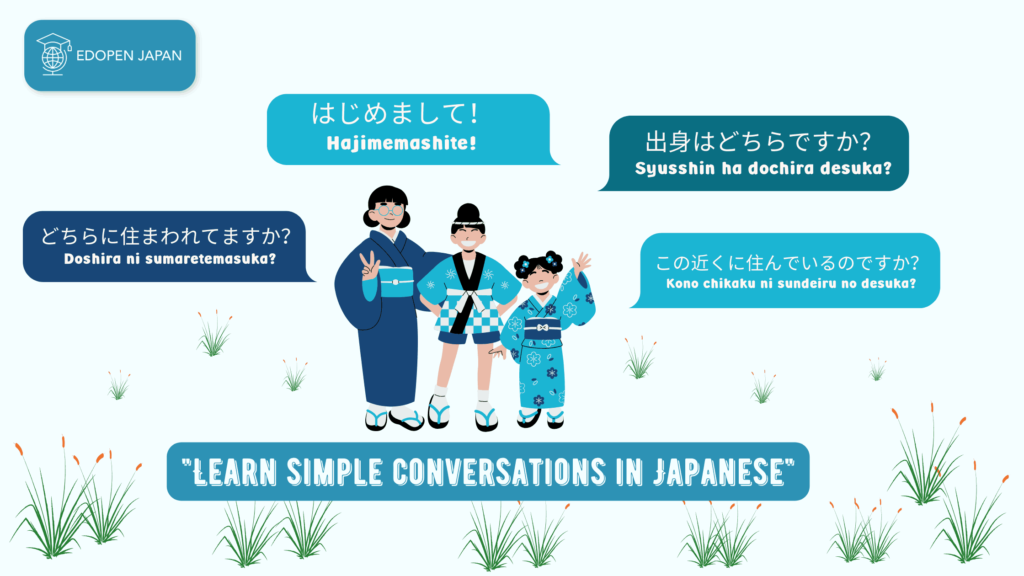
To learn Japanese, it’s important to access resources for reading, watching, or listening to the language. You can practice speaking Japanese by repeating the vocabulary found in literature, videos, or music.
Although the written language and spoken language can differ in certain situations in Japanese, the fundamental vocabulary and grammar remain fairly consistent.
Especially if you’re practicing Japanese speaking, it’s best to begin with learning how to hold a Japanese conversation. Enjoy learning by watching videos? If so, we suggest you learn Japanese conversation with Erin below.
There are also dialogue scripts available to facilitate understanding of the Japanese vocabulary used in every scene. This allows you to envision how the terms are employed in practical situations.
3. Read out loud every Japanese word and sentences you have learned
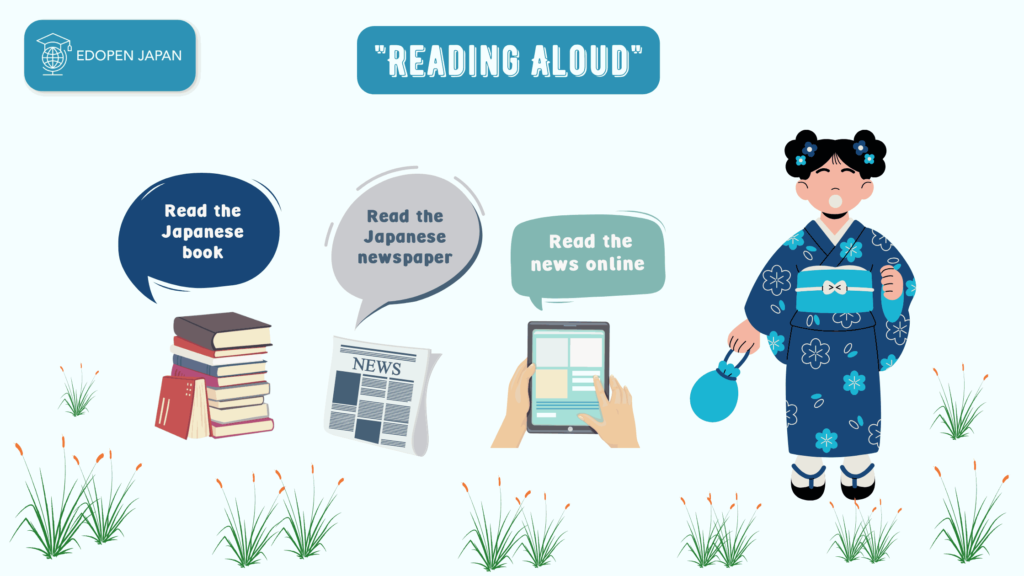
Reading aloud is a helpful technique to quickly recall Japanese vocabulary. Apart from enhancing memory retention, it also offers an opportunity to verify enunciation. This practice has a positive impact on improving Japanese conversational ability.
If you have a tutor who is a native speaker, they can help you improve your pronunciation. To practice reading Japanese, consider reading articles, books, and news in Japanese.
Reading aloud while learning Japanese provides multiple benefits for beginners. For instance, it promotes familiarity with new vocabulary, helping the brain process both the vocabulary and its context simultaneously.
4. Find the best resource to listen Japanese lesson
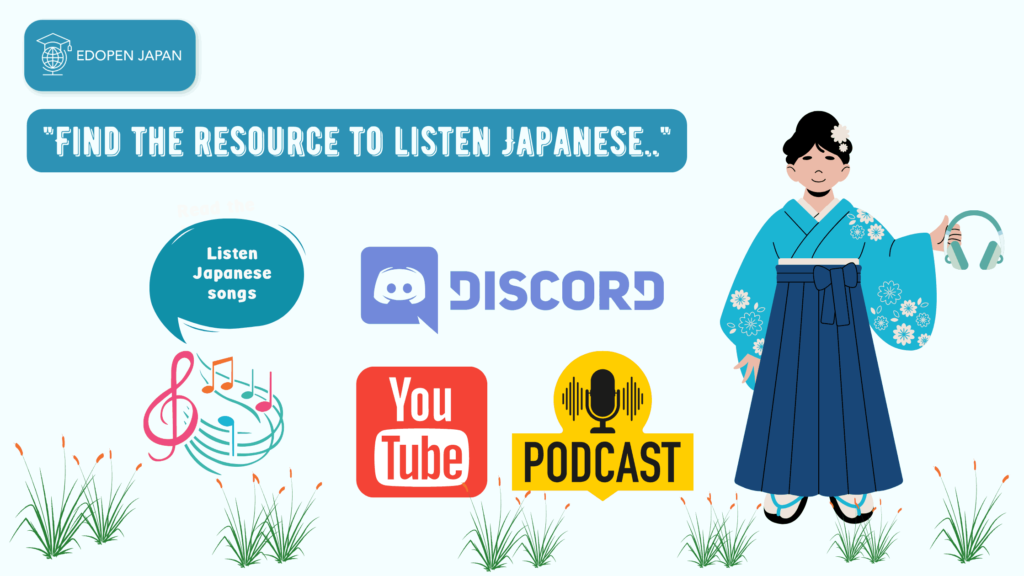
Listening is the primary perceptual skill that every person develops. Improving your listening abilities enhances your understanding and communication skills.
This is the case with learning Japanese. This approach will aid in quickly comprehending the Japanese language. Listen to a variety of information about Japanese through platforms such as Youtube and Podcasts. Regularly and repeatedly listen to different topics.
Listening to these media sources repeatedly and consistently can enhance your Japanese speaking ability to become more natural and proficient. Effective listening skills are a crucial component tested on the JLPT exam, thus refining your listening abilities is imperative.
5. Write and read any Japanese lessons you have learned
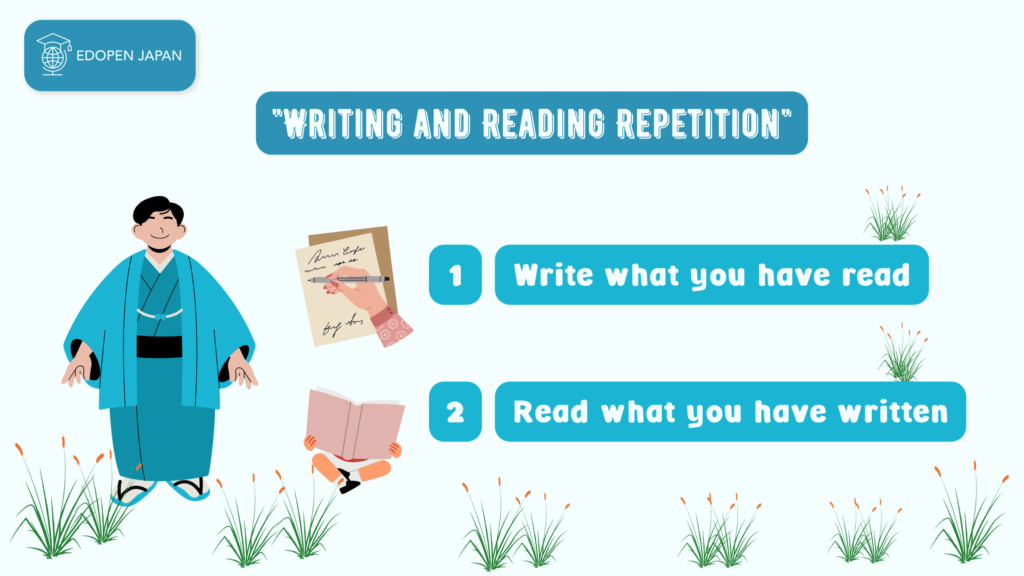
Have you ever heard that writing can greatly enhance academic performance? This was definitely true for me when I learned Japanese. Writing kanji character by character and even word by word helped me remember them well. I could easily conceptualize each lesson and digest them faster, making the learning process easier.
That makes learning Japanese a very enjoyable process. If you aim to enhance your proficiency in spoken Japanese, make sure to note down each lesson you acquire. Doing so will significantly aid you in remembering and cataloguing the knowledge you have gained.
6. Shadowing the Japanese lesson
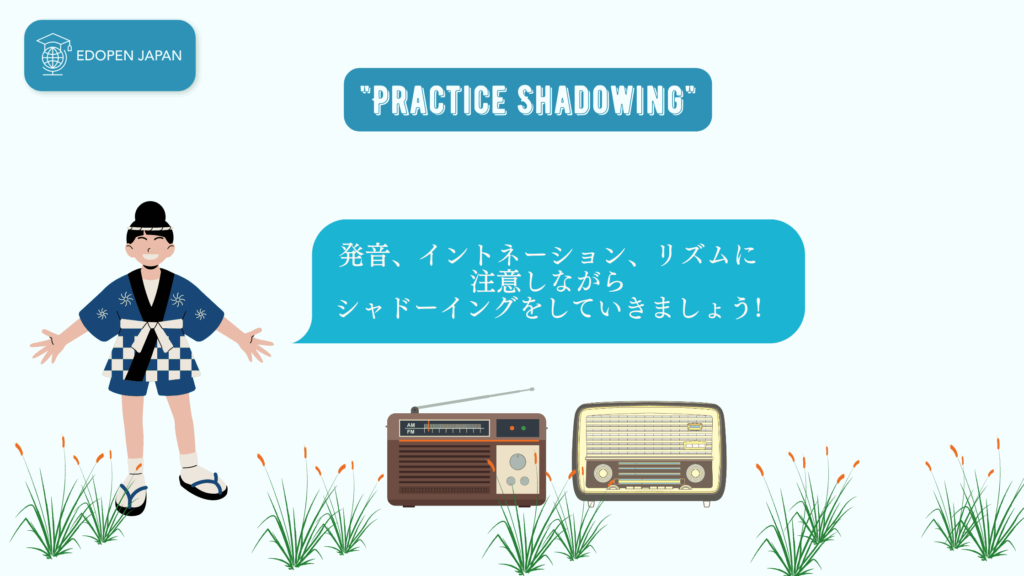
Have you ever heard of the term “shadowing”?
Yep, this is a practical trick recommended by several native Japanese teacher. Shadowing involves imitating the speech of a native Japanese speaker and repeating their words after a delay of 1-5 seconds.
Shadowing is a powerful tool for improving your Japanese pronunciation. By breaking down complex sounds into smaller parts, shadowing can help you focus on accurate articulation while also practicing native intonation. With regular practice, you’ll achieve a beautiful level of fluency that is both precise and expressive.
What is the step-by-step of practicing shadowing? You can start as below:
- Find an audio/video to practice with.
- Listen to the audio/video at least once. This is to acclimatize yourself to the native speaker’s accent, rhythm and intonation.
- Start the shadowing exercise by repeating what the native speaker says as quickly and accurately as possible. Just follow the native speaker’s voice and speaking style.
- Record yourself and listen
- Compare and assess your own shadowing recording with the native speaker. Then, find the flaws and improve them.
Now, give it a shot! Remember to share your experience practicing shadowing in the comments section below.
7. Join Japanese conversation class

Although abundant materials for practicing Japanese speaking can be found both offline and online, and individuals can practice independently, it is crucial to attend a conversation class.
And conversational activities are a necessary component of any Japanese language school. There are even Japanese language schools that specialize solely in conversational Japanese courses.
Because this is your way to securing company interviews, entering Japanese speech competitions, qualifying for company scholarships in Japan, obtaining part-time work opportunities in Japan, and unlocking various other valuable opportunities.
Therefore, don’t forget to enroll in a Japanese conversation course. We will provide you with our top-rated Japanese tutors and native speakers to guide you in your classes.
8. Sing Japanese songs everyday
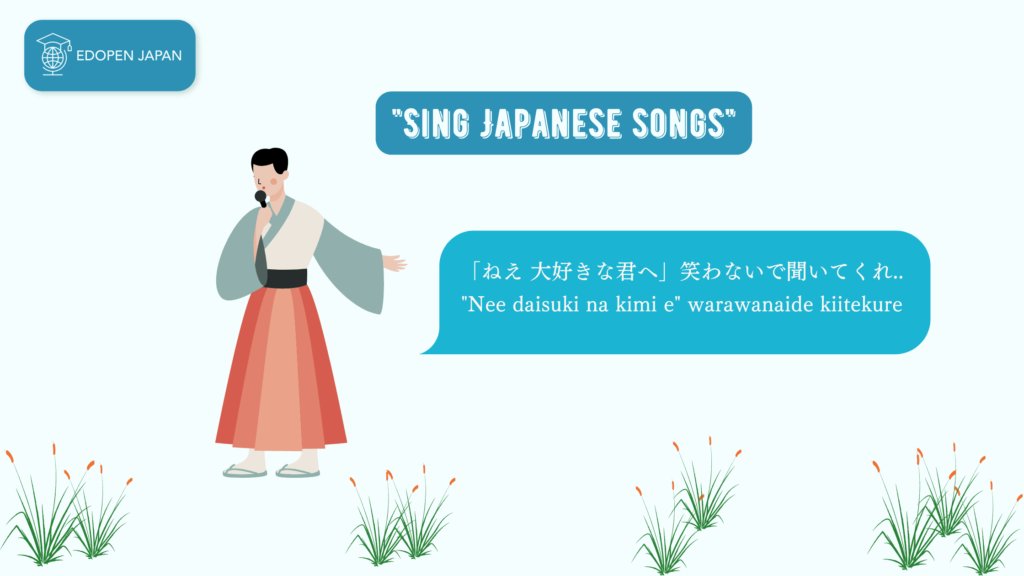
According to recent studies, music can stimulate different parts of the brain and improve memory in Alzheimer’s and dementia patients. The melody in the music aids in the retention and recording of vocabulary, activating both the left and right hemispheres of the brain.
Therefore, we highly recommend listening to and singing Japanese songs. Practicing singing Japanese songs can enhance your fluency, aid in memorizing and retaining the vocabulary, sentences, and meanings of new Japanese words in the lyrics quickly.
In addition to the enjoyable learning experience, listening to Japanese music can also reinvigorate your enthusiasm for activities. Here are the top and most famous Japanese songs you should listen to!
9. Find Japanese friends to use Japanese

In learning a foreign language, such as Japanese, it’s crucial to have meaningful interactions to aid the comprehension process. Interactions give us the chance to gauge our mastery of the language teachings. Thus, we require friends as interlocutors to help us practice.
If you have the opportunity to connect with a Japanese-speaking native or someone who shares your love for the language, you can reap various benefits that undoubtedly improve your Japanese language skills.
Studies have shown that studying with a friend leads to increased motivation and better retention. Sharing tips, tricks, and experiences can enhance learning Japanese. To achieve this, studying Japanese with friends is highly recommended.
But how do you go about finding a Japanese study partner? No need to fret. You can easily locate a compatible Japanese study partner by joining an active community of Japanese language learners on social media or well-known chat/video applications such as Discord.
There, you can easily find servers or communities that actively distribute diverse Japanese language resources and regularly host conversation classes for all members. It’s exceptionally fascinating and surely a must-try for you!
10. Speak Japanese lesson you have learned with confidence
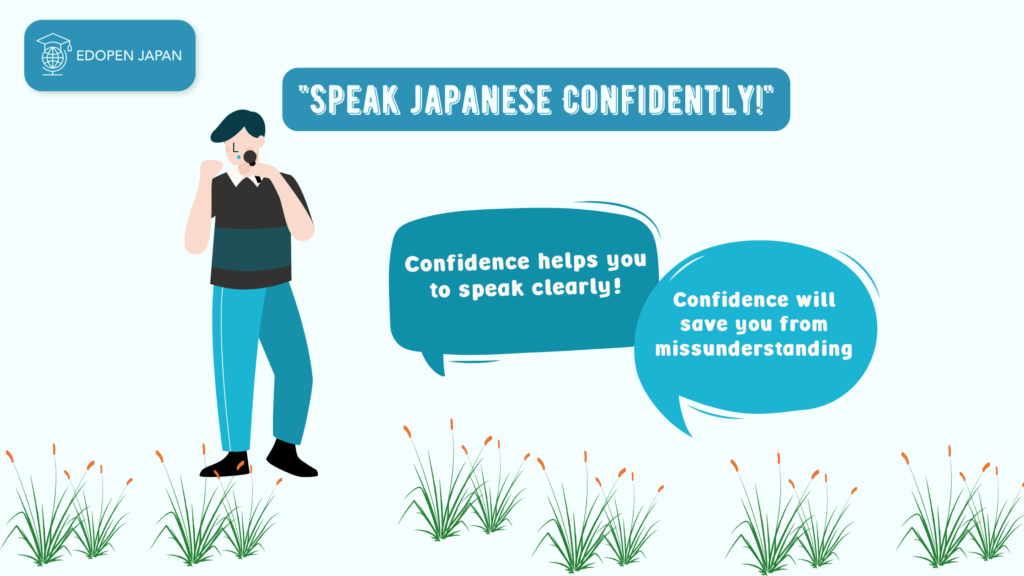
Self-confidence is one of the key factors that contribute to the Japanese learning process. When you are confident, you can communicate clearly and effectively. You don’t have to rush when trying to pronounce every single vocabulary phrase. Your goal should be to make your pronunciation clear and understandable to the other person.
At the outset, pronunciation may be challenging and stuttered. Nevertheless, with confidence and clarity of thought, you can speak more fluently and distinctly. Conversely, lacking self-assurance can cause your pronunciation, intonation, and articulation to be unclear and open to misinterpretation.
Even if you mispronounce some words, don’t worry as long as you are confident; the other person will still understand you. They can give you feedback to correct any mistakes. There’s no need to be embarrassed, pronunciation errors are common.
Speak confidently to ensure clear pronunciation. While your words may be wrong or inaccurate, avoid making your interlocutor guess, leading to misunderstandings.
Looking for more information on how to speak Japanese fluently?

- How do I teach myself to speak Japanese?
If you are a novice in learning Japanese, it is vital to select the proper learning materials. Start by learning basic Japanese conversations and increase your exposure to the language by engaging in direct activities such as watching Japanese anime and listening to Japanese music. Then, you can buy Japanese textbooks and study them regularly. - How should a beginner learn Japanese?
To begin learning Japanese, it’s essential for beginners to first master the Japanese alphabet, which consists of Hiragana and Katakana. From there, you can progress to studying grammar and kanji. Achieving proficiency in Japanese requires consistency and dedication over time. Practicing daily will improve your overall efficiency in mastering the language.
With consistent reading and diligent study, you can successfully master Japanese. Additionally, consider utilizing books to enhance your understanding and proficiency. With consistent reading and diligent study, you can successfully master Japanese. - How can I start speaking Japanese?
To speak Japanese fluently, it’s crucial to listen attentively. Focus on breaking down complex sentences into smaller parts for better understanding and improved speaking skills. Begin by listening to straightforward Japanese dialogues on language learning websites. Additionally, you can immerse yourself in Japanese music or podcasts to boost your speaking ability consistently. - Is Japanese an easy language to speak?
According to the United States Foreign Service Institute, Japanese falls under the category V of super-difficult languages for English speakers, alongside Mandarin, Cantonese, Korean, and Arabic. The complexity stems from the use of hiragana, katakana, and kanji in the Japanese writing system.Nevertheless, with the correct learning approach and persistence, mastering Japanese is attainable. Anyone with the willingness to try can acquire Japanese language skills. - Can I teach myself Japanese?
Learning Japanese has become more accessible with the availability of online resources. While taking a Japanese class can facilitate learning with guidance from a teacher, the key factor in mastering the language lies in how one utilizes Japanese language material, whether with or without a teacher. - How long does it take to speak Japanese fluently?
Many Japanese language schools adopt a curriculum system that requires a minimum of 3-6 months to master basic Japanese language material. Intermediate and advanced levels require 1-3 years of study.Typically, Japanese language schools aim for N2 proficiency within a year of study, and N1 proficiency within a study period of 1.5 years or more. - How to learn Japanese step by step?
First, master hiragana and katakana, then gradually progressto grammar, kanji, and vocabulary in Japanese. Avoid casual language and slang, and aim for clarity and precision when communicating in a professional context. Study Japanese language materials in books to learn more consistently and gain a solid foundation. - How do I practice speaking Japanese?
Try practicing reading Japanese texts aloud. You can do this in front of a mirror. Listen to a variety of Japanese podcasts and read the accompanying scripts regularly.Then, consider joining a Japanese language learning community to find a native Japanese teacher or friend with whom you can practice the material you’ve studied. - Can you learn Japanese just speaking?
To learn Japanese, simply focusing on speaking may not be enough. Though it is a good start, to achieve a full understanding and proper fluency, one must develop skills in reading, writing, and listening as well. Additionally, reading and listening comprehension are crucial factors in mastering spoken Japanese. - Do you need kanji to speak Japanese?
In person, speaking Japanese does not necessarily require knowledge of kanji. However, to expand your Japanese vocabulary and articulate yourself precisely, accurately, and elegantly, kanji proficiency is crucial.
Conclusion
There you go, the 10 simple steps to learn how to speak Japanese. As a reminder, it’s worth reviewing these 10 very simple steps. What are they? You need to learn how to pronounce hiragana, katakana and kanji at first. Then, try to learn simple Japanese conversations consistently. Here, read out loud every Japanese word and sentences you have learned.
Next, search for the best resources to listen to Japanese language lessons and make sure to write and read any material you have learned. Shadowing the lessons can improve your speaking ability. Enroll in a Japanese conversation class, sing Japanese songs every day, find friends to practice with and speak with confidence. These steps will help you reach an intermediate or advanced level of Japanese proficiency.
What are your thoughts? Which step have you taken and how did it turn out? Please share your experience in the comments section below and stay tuned for the next article.
References
[1] Data of the Test in 2023 (July). The Official JLPT Website. Retrieved 16 November 2023.
[2] Worldwide Number of Students of Japanese Sees Slight Decline Amid Pandemic. Nippon Communications Foundation. Retrieved 16 November 2023.













